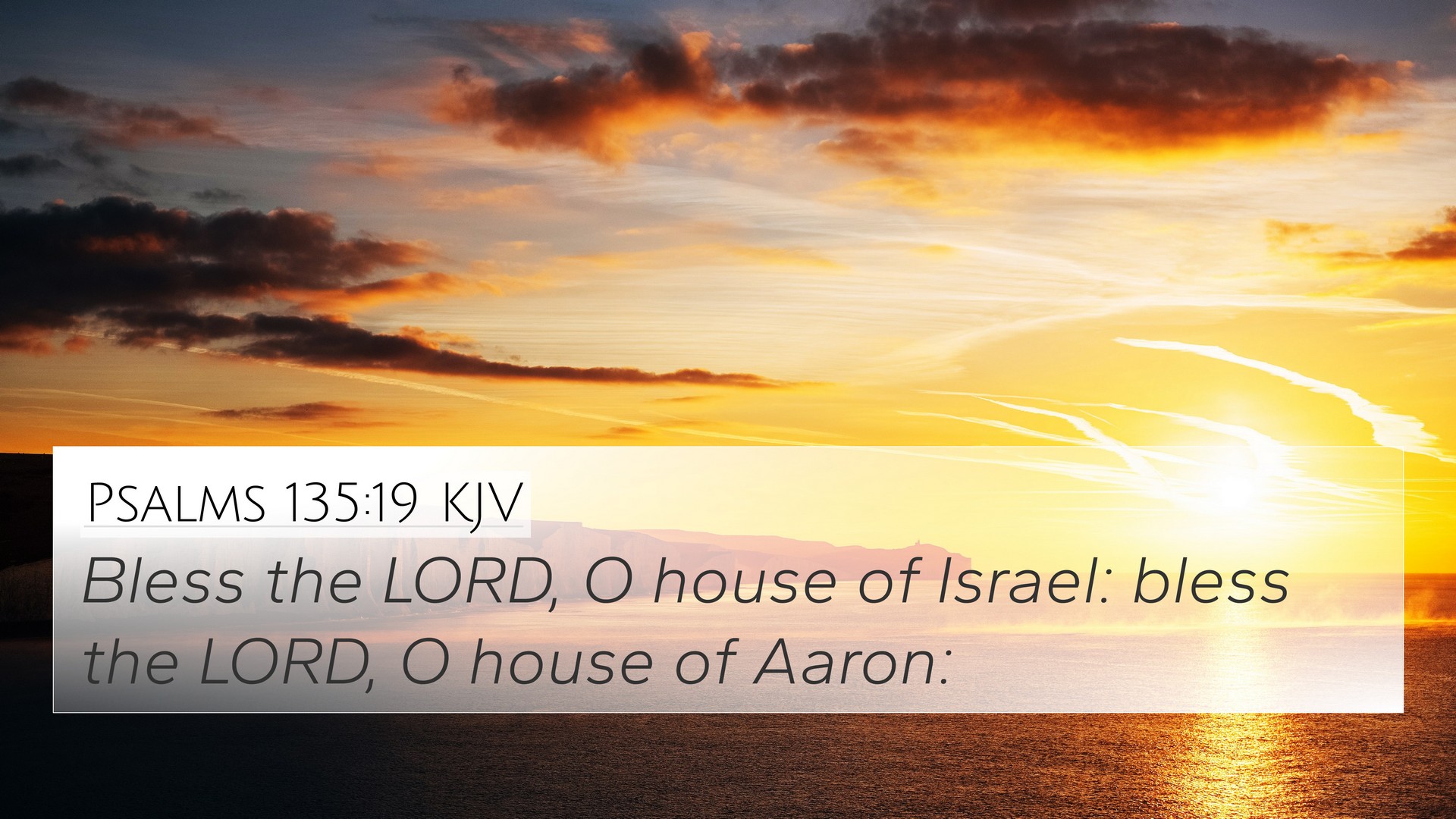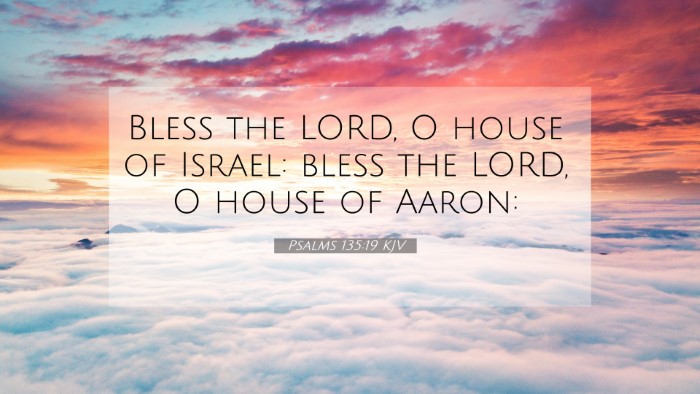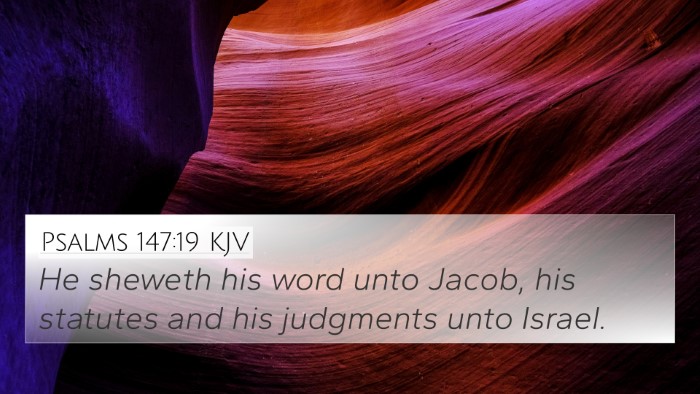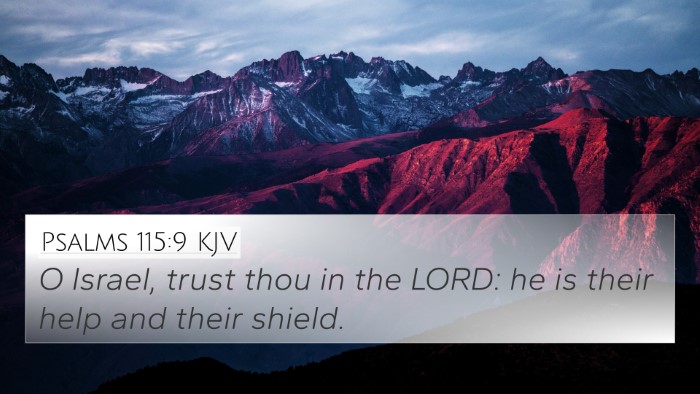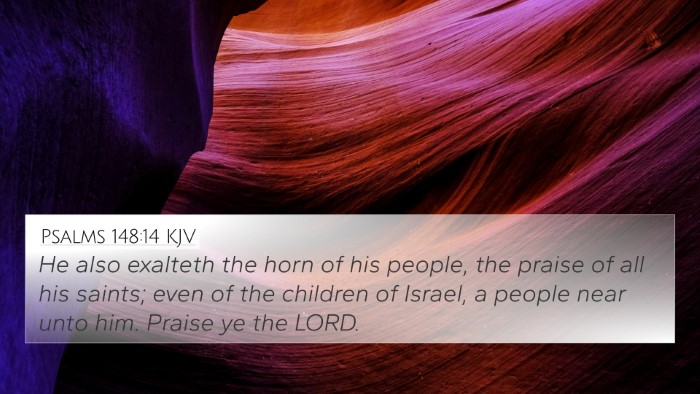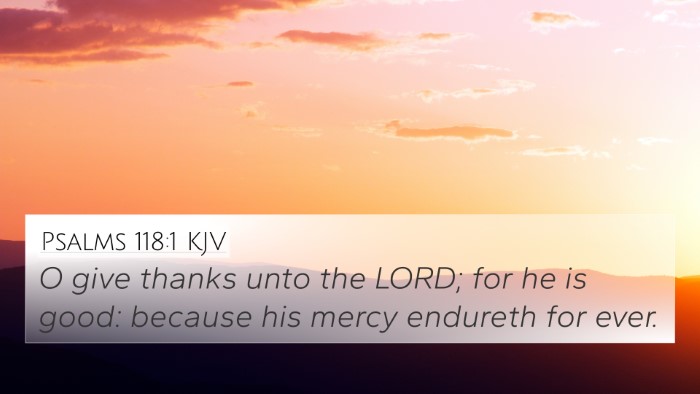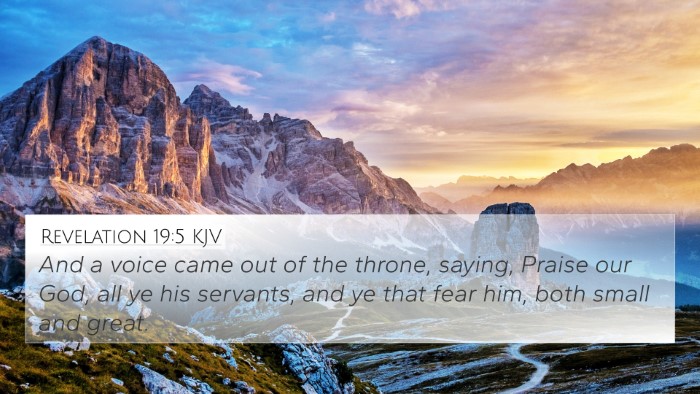Psalms 135:19 - Understanding the Verse
Psalms 135:19 states: "O house of Israel, bless the LORD; O house of Aaron, bless the LORD; O house of Levi, bless the LORD; ye that fear the LORD, bless the LORD." This verse serves as an exhortation to different groups within Israel to offer praise to God.
Meaning of Psalms 135:19
This psalm is a call to worship that emphasizes the importance of praising the LORD. The verse highlights various groups of people within the community of Israel, namely the houses of Israel, Aaron, Levi, and all who fear the LORD, each being called to bless God's name.
Exegesis and Insights from Commentaries
-
Matthew Henry:
Henry explains that this verse underlines the collective responsibility of all believers to worship God. The mention of specific houses, such as the house of Aaron (the priests) and the house of Levi (the Levites), signifies the roles of the religious leaders within the community. Everyone, regardless of rank or function, is urged to bless God. This practice of blessing is both an acknowledgment of God's sovereign goodness and an appropriate reaction to His mercy.
-
Albert Barnes:
Barnes emphasizes the universality of the command to bless the LORD, noting that "all who fear the LORD" extends the call beyond the priestly caste to include every follower of God. He suggests that this invitation fosters a sense of communal worship, aligning the congregation in their devotion to God while also prompting individual acknowledgment of divine blessings.
-
Adam Clarke:
Clarke points out the significance of the names used, observing that the 'house of Israel' represents all the tribes, while 'Aaron' and 'Levi' indicate the priestly lineage. Clarke remarks that this verse not only encourages worship among leaders but also among the common people, thus illustrating the democratic nature of worship in Israel where all can approach God.
Cross-References and Related Verses
Psalms 135:19 is richly connected to various passages throughout Scripture that reinforce the themes of blessings, communal worship, and the roles of different groups in praising God. Here are some significant cross-references:
- Psalms 115:9-11: "O Israel, trust thou in the LORD: he is their help and their shield." This reiterates the call for all of Israel to trust and praise God.
- Psalms 134:1: "Behold, bless ye the LORD, all ye servants of the LORD." This emphasizes serving and blessing the LORD during worship.
- Psalms 118:26: "Blessed be he that cometh in the name of the LORD." This is a direct acknowledgment of God's blessings through those who recognize His sovereignty.
- Hebrews 13:15: "By him therefore let us offer the sacrifice of praise to God continually." This refers to the ongoing necessity for believers to present praise to God.
- Matthew 5:14-16: "Ye are the light of the world... let your light shine before men." This connects the idea of public praise and worship to God, encouraging believers to shine forth in their devotion.
- 1 Peter 2:9: "But ye are a chosen generation, a royal priesthood, an holy nation." Here, the identity of New Testament believers as a royal priesthood finds a parallel in the Old Testament call.
- Revelation 1:6: "And hath made us kings and priests unto God." This ties into the continual priestly role within the new covenant that sees all believers as part of God's holy priesthood.
- Romans 12:1: "Present your bodies a living sacrifice, holy, acceptable unto God." This teaches the concept of worship as a lifestyle, echoing the communal nature of praising God as seen in Psalms 135:19.
- Isaiah 56:7: "For mine house shall be called a house of prayer for all people." This shows God's desire for all people to engage in worship and prayer, much like the call in Psalms 135:19.
- Colossians 3:16: "Let the word of Christ dwell in you richly... singing with grace in your hearts to the Lord." This connection highlights the importance of corporate worship and mutual edification.
Thematic Connections
The thematic connections within Psalms 135:19 call attention to God's covenant with His people and the responsibility that follows. Each group mentioned is provided an opportunity to express their gratitude, emphasizing:
- The Role of the Church: Just as the Hebrew community was called to bless God, the New Testament church has the same responsibility—to proclaim His glory.
- Inclusivity in Worship: This verse illustrates that worship is not relegated to a few; rather, it encompasses all who fear the LORD.
- Guidance in Worship Practices: Establishing structured worship is reflected in both testaments, serving as a model for understanding the proper attitude and activities of worship.
Practical Implications for Believers
Reflecting on Psalms 135:19, believers today can draw several practical applications:
- Collective Worship: Engaging in worship with the community reinforces mutual faith and commitment to God.
- Individual Responsibility: Each believer is called to personally bless the LORD and recognize His work in their lives.
- Fostering Respect for Leadership: Acknowledging the roles of spiritual leaders while maintaining a personal relationship with God encourages growth within the church.
Conclusion
Psalms 135:19 serves as a powerful reminder of the call to worship directed at all facets of the community. Through the integration of various commentaries and thematic connections, it becomes apparent that both the Old and New Testaments advocate for a collective and individual posture of blessing and praising God. Engaging with this verse through a cross-referencing methodology can deepen one’s understanding and appreciation of the rich, interconnected tapestry of Biblical theology.
